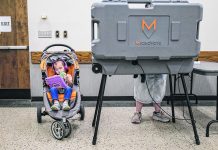The Columbus Area Visitors Center won’t seek a food and beverage tax this year to fund sports tourism growth.
And the organization is not likely to advocate for the tax in the foreseeable future, said Visitors Center Executive Director Karen Niverson.
The idea to implement the tax, which recreates a revenue stream from a percentage of taxable food and beverage transactions, surfaced in recommendations from a Phoenix-based consulting group presented to the center’s board of directors earlier this year.
“It was one of several suggestions, but we never really had a plan to move forward with it,” Niverson said.
[sc:text-divider text-divider-title=”Story continues below gallery” ]
Fifteen cities and 12 counties in Indiana have enacted the tax that provides each unit of government 1 percent of the gross retail income received from taxable food and beverage transactions.
Although former Columbus Mayor Fred Armstrong proposed a food and beverage tax in 2006, current Columbus City County President Frank Miller said nobody at city hall has discussed it over the past six-and-a-half years.
Even if the center had proposed a food and beverage tax to the city council later this year, Miller said any serious consideration “would be a long way off.”
What is being discussed in local political circles is an already strong anti-tax sentiment that has just recently grown even stronger, Miller said.
On June 20, the city council voted 5 to 2 to increase its own cumulative capital development tax rate to the maximum allowed by the state last month.
Although Miller voted against the increase, he heard several local residents accused the city council of “picking taxpayers’ pockets” prior to the vote.
A food and beverage tax has also never been seriously considered at the county level, Bartholomew County Auditor Barb Hackman said.
That’s because such a tax needs the approval of the state Legislature, which has placed several restrictions on how the revenue can be spent, Bartholomew County Council President Laura DeDomenic said.
While county councilmen will vote July 18 on establishing a cumulative capital improvement tax for the county, the only other new revenue streams considered in recent years have been the local option income tax and a wheel tax, Hackman said.
Consideration of local income taxes by the county council likely won’t take place until August, while the wheel tax “is off their radar right now,’ “ Hackman said.
After attending a July 3 public hearing held by the county council that evolved into a discussion of new taxes in general, Miller said he doesn’t know how the county can address their unmet financial needs with the anti-tax sentiments.
“I don’t feel the city’s back is against the wall, but the county is having a lot more financial issues,” Miller said. Those issues include:
Two more public defenders needed in the courts, according to a May commission finding.
A near-capacity jail population that increases danger and potential legal liability.
Jail medical expenses that are projected to increase 39 percent compared to last year.
$12 million in building renovations and new facilities needed over the next decade, according to consultant’s findings released in February.
About 20 additional deputies needed for public safety in order to meet state guidelines.
Miller says the problem is that “there’s just so many other taxes coming down at this time.”
On July 1, all Hoosiers began paying dozens of new state taxes and fees, including a 10 cents-per-gallon gasoline tax hike and a $15 increase in vehicle registration fees.
“It just doesn’t seem like there’s any end to it,” Bartholomew County resident Glen Petri told the county council during this month’s public hearing.
“With all these Republicans, one would think our fiscal house would be in order _ but it is not,” Russ Poling, Sr. told the councilmen. “Almost every elected official wants to raise our taxes and institute new fees. Enough is enough.”
Many in Columbus and Bartholomew County are wary of any new county tax after consultants suggested a $5 million new county highway garage earlier this year, Rockcreek Township farmer Ron Speer said.
The county dropped plans for a $3.25 million Bartholomew County Annex building in the fall of 2015 because of a lack of funding, Speer said.
But after hearing about the county’s financial challenges, another Bartholomew County farmer known to be critical of new taxes _ Don Strietelmeier _ seemed sympathetic and understanding toward the county council.
“You’ve got to provide the services and take care of the things we’ve got,” Strietelmeier said to the council. “There are a lot of citizens that an increase in taxes wouldn’t hurt them a bit. Just try to avoid hurting the ones who will be hurt.”




